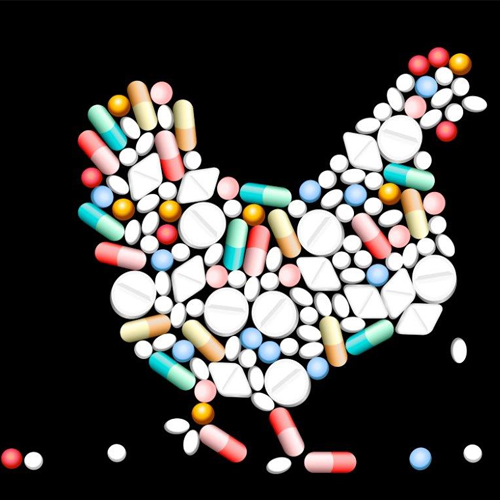Resistance to antibiotics is on the rise partly due to inappropriate use by humans and partly due to the widespread use of these drugs in the livestock and poultry industry.
Like humans, birds and animals are easily susceptible to infections. Poultry farms are very prone to bacterial epidemics as the birds are held in cages in close captivity which brings them in extremely close contact with one another. They also share water and feed troughs which causes illnesses to spread rapidly. Sometimes, veterinarians recommend using antibiotics to prevent diseases when there is a very bad outbreak of bacterial infection, but many poultry owners use these antibiotics indiscriminately.
Antibiotic use in the poultry industry has reached epic proportions because it is easier and inexpensive to administer drugs instead of keeping the birds healthy organically by keeping the environment of the farm clean and hygienic and giving the birds space and good nourishment to grow. In addition, even as awareness about waste management is growing, these efforts are useless if small businesses and commercial establishments do not follow through with the proper disposal of their waste.
The Centre for Science and Environment (CSE) has stated that rampant misuse of antibiotics in the poultry industry is producing negative consequences for the environment and the health of all. Unregulated use of these antibiotics in this industry is producing drug-resistant bacteria that spread to the general human population due to poor waste management techniques.
The CSE’s Pollution Monitoring Laboratory collected random litter and soil samples from 12 poultry farms from UP, Haryana, Rajasthan and Punjab and 217 isolates of three types of bacteria (E. coli, Klebsiella pneumoniae and Staphylococcus lentus) were extracted and tested for resistance against 16 antibiotics. Out of these, 10 antibiotics have been declared critically important for humans by the World Health Organization (WHO).
The study found that 100 per cent of E. coli, 92 per cent of Klebsiella pneumoniae and 78 per cent of Staphylococcus lentus isolated from the poultry environment were multi-drug resistant. These bacteria can easily spread to the human population through the litter which is used to fertilize agricultural fields. These bacteria when spread to humans cause infections that are incurable.
The situation is so alarming because both E. coli and Klebsiella pneumoniae have developed very high resistance to common antibiotics that are used to treat humans such as penicillins and fluoroquinolones. They have, in fact, become resistant to even last resort antibiotics like third and fourth generation cephalosporins and carbapenems, which is only used in hospitals.
The recent death of Playboy founder Hugh Hefner was attributed partly to a bacterial infection caused by a particularly drug-resistant form of E-coli. E coli infection only lasts about a week in a healthy adult, but in older people and young children, the infection can go on to cause a life-threatening form of kidney failure, which could lead to death.
Scientists have developed many new drugs in the past several decades to fight these drug-resistant bacterial infections. But each time, the indiscriminate use of antibiotics has prompted bacteria to develop new ways to counter them.
It is necessary that strict laws be passed by the Ministry of Environment, Forests and Climate Change along with the Central and State pollution control boards to regulate the use of antibiotics in the poultry industry and prevent the spread of these bacteria from farms to humans.
Alternate manure management options such as bio-gas generation should be promoted and composting of antibiotic-infected litter should be carried out only if other options are unavailable.
It should be mandatory for poultry farmers to maintain their farms in such a manner that livestock remain healthy because of hygienic conditions and good nourishment. The regular use of antibiotics should be avoided as far as possible. A system to check the maintenance of these farms should be in place.
Free-range poultry is in great demand in western countries but is yet to catch up in India. Maybe, if the government offered subsidies and incentives to poultry farmers who use more organic ways to maintain their birds, there would be a shift from these unhealthy practices to better ways of managing poultry.
As concerned consumers, it is up to us to take precautions and find out which farms use proper techniques to maintain their birds and buy produce only from these places thus forcing other farms to do the same. It is only when we take a stand against wrongful practices that we will get what we deserve.

